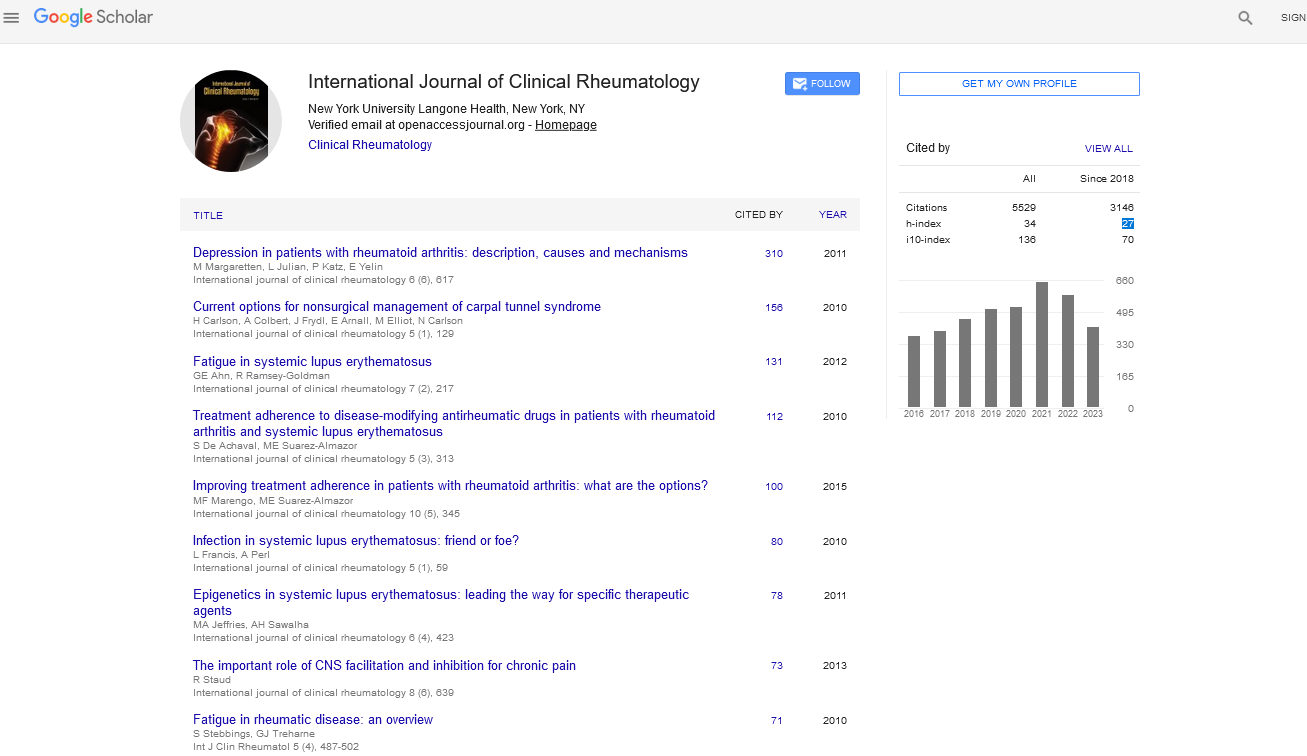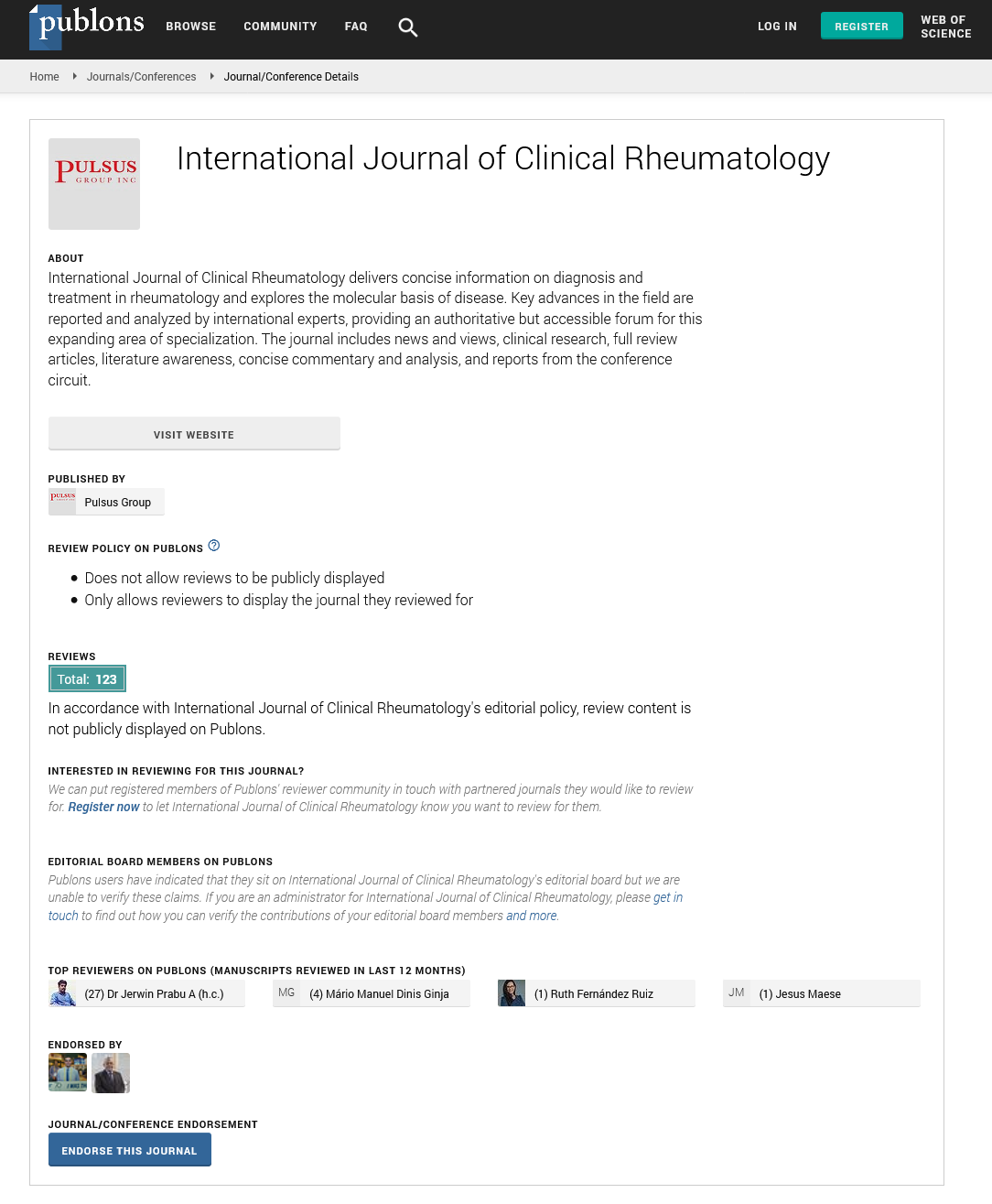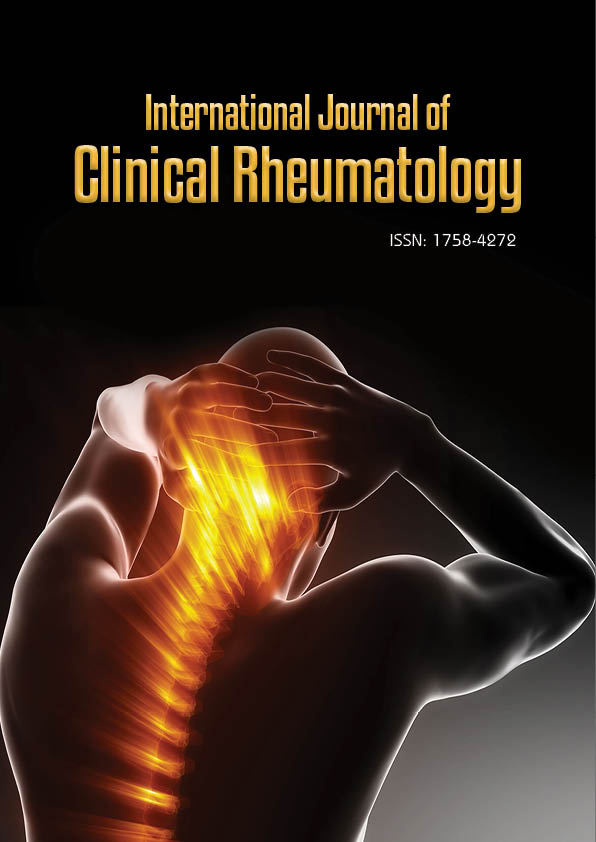Short Communication - International Journal of Clinical Rheumatology (2022) Volume 17, Issue 7
Denosumab does not increase infection risk in rheumatic disease patients when used alone or in combination with biologic dmards
Silvano Adami*
University of Verona, Reumatologica, Ospedale 37069 Valeggio, Verona, Italy
Received: 04-Jul-2022, Manuscript No. IJCR-22-124; Editor assigned: 05-Jul-2022, PreQC No. IJCR-22-124(PQ); Reviewed: 19-Jul-2022, QC No. IJCR-22-124; Revised: 25-Jul-2022, Manuscript No. IJCR-22-124(R); Published: 01-Aug-2022 DOI: 10.37532/1758-4272.2022.17(6).124-125
Abstract
Introduction
Patients with rheumatic diseases who are treated with denosumab (Prolia®, Xgeva®) either alone, or in combination with either biologic or non-biologic disease-modifying antirheumatic drugs (DMARDs), do not appear to have a significant increased risk of infections, according to new research presented at the American College of Rheumatology Annual Meeting in Boston.
People with a number of rheumatic diseases use DMARDs to treat their inflammation and help control disease activity, including rheumatoid arthritis, or RA. Rheumatoid arthritis is a chronic disease that causes pain, stiffness, swelling and limitation in the motion and function of multiple joints [1]. Although joints are the principal body parts affected by RA, inflammation may develop in other organs as well. An estimated 1.3 million Americans have RA, and the disease typically affects women twice as often as men.
About the Study
Due to their immunosuppressant mechanisms, biologic DMARDs, may increase the risk of infection in rheumatic disease patients. It is unknown if denosumab, a RANK-ligand inhibitor used in the treatment of osteoporosis, also increases infection susceptibility. RANK is a member of the tumor necrosis factor receptor (TNFR) superfamily, so may also suppress the immune system [2]. Past research has showed an increase in cellulitis and erysipelas in patients on denosumab.
To find out if denosumab increased infection risk in rheumatic disease patients, researchers at Drexel University College of Medicine in Philadelphia culled retrospective data from chart reviews of patients in specialty rheumatology practice to evaluate infection rates and hospitalizations of 136 patients: 36 on a combination of biologics and denosumab, 50 on biologic agents alone and 50 on denosumab alone. The biologics studied included infliximab (Remicade®), tocilizumab (Actemra®), rituximab (Rituxan®), belimumab (Benlysta®), abatacept (Orencia®), adalimumab (Humira®) and golimumab (Simponi®) [3].
The objective of the study was to evaluate whether denosumab with a biologic will increase risk of infection more than that from a biologic alone. We were also interested to see if addition of oral DMARDs and prednisone to denosumab would influence the risk of infection.
The researchers found no difference in infection risk between the groups that received both biologic and denosumab compared to biologics alone. There were statistically significant increases in the risk of infection in the groups that received both biologic and denosumab compared to the group that received denosumab only, as well as the group taking only a biologic compared to only denosumab [4].
Hospitalization rates were higher in the combination group compared to those taking only denosumab. There were statistically significant increases in the risk of infection with increased duration of exposure to biologics as well. Secondary characteristics also did not affect the compared rates of infection [5].
Conclusion
The study's authors concluded that denosumab, taken either alone or in combination with biologics, does not significantly increase infection risk in rheumatic disease patients. Patients' duration of exposure to denosumab also did not affect the infection rate. In addition, the authors noticed no increased risk of infection in patients on a combination of non-biologic DMARDs and denosumab. They concluded that it seems relatively safe to use denosumab in combination with other diseasemodifying drugs to treat rheumatic disease patients.
Although the safety profile of denosumab has been studied in the past and it has shown to be relatively safe with a slight increase in skin infections this is the first study to evaluate infection risk in combination with a biologic. Our study showed no increase in the risk of infection in patients who received denosumab with a biologic over the patients who received a biologic alone. These results suggest that denosumab may be safely administered in patients with connective tissue diseases on biologics who already have an increased risk of metabolic bone disease.
Acknowledgement
None
Conflict of Interest
There is no Conflict of Interest.
References
- Lau AN, Wong-Pack M, Rodjanapiches R et al. Occurrence of serious infection in patients with rheumatoid arthritis treated with biologics and denosumab observed in a clinical setting. J Rheumatol. 45(2), 170-176 (2018).
- Mikuls TR, Johnson SR, Fraenkel L et al. American College of Rheumatology Guidance for the management of rheumatic disease in adult patients during the COVID‐19 Pandemic: version 2. Arthritis Rheumatol. 72(9), e1-e12 (2020).
- Curtis JR, Xie F, Yun H et al. Risk of hospitalized infection among rheumatoid arthritis patients concurrently treated with a biologic agent and denosumab. Arthritis Rheumatol. 67(6), 1456-1464 (2015).
- Richez C, Flipo RM, Berenbaum F et al. Managing patients with rheumatic diseases during the COVID-19 pandemic: The French Society of Rheumatology answers to most frequently asked questions up to May 2020. Joint Bone Spine. 87(5), 431-437 (2020).
- Singh JA. Infections with biologics in rheumatoid arthritis and related conditions: a scoping review of serious or hospitalized infections in observational studies. Curr Rheumatol Rep. 18(10), 1-9 (2016).
Indexed at, Google Scholar, Crossref
Indexed at, Google Scholar, Crossref
Indexed at, Google Scholar, Crossref
Indexed at, Google Scholar, Crossref


